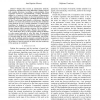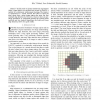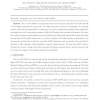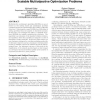711 search results - page 40 / 143 » An Empirical Comparison of Selection Methods in Evolutionary... |
GECCO
2005
Springer
14 years 1 months ago
2005
Springer
In this work we provide empirical evidence that shows how a variable-length genetic algorithm (GA) can naturally evolve shorter average size populations. This reduction in chromos...
CEC
2009
IEEE
14 years 2 months ago
2009
IEEE
— Despite their success as optimization methods, evolutionary algorithms face many difficulties to design artifacts with complex structures. According to paleontologists, living...
CEC
2008
IEEE
14 years 2 months ago
2008
IEEE
— In this article we present results from experiments where a edge detector was learned from scratch by EANT2, a method for evolutionary reinforcement learning. The detector is c...
JNCA
2011
13 years 2 months ago
2011
Voice over IP (VoIP) is an important service on the Internet, and privacy for VoIP calls will be increasingly important for many people. Providing this privacy, however, is challen...
GECCO
2007
Springer
14 years 1 months ago
2007
Springer
Multiobjective evolutionary algorithms (MOEA) are an effective tool for solving search and optimization problems containing several incommensurable and possibly conflicting objec...




